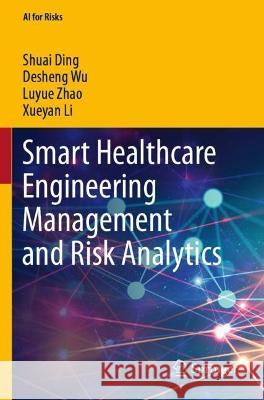Smart Healthcare Engineering Management and Risk Analytics » książka
topmenu
Smart Healthcare Engineering Management and Risk Analytics
ISBN-13: 9789811925627 / Angielski / Miękka / 2023
Smart Healthcare Engineering Management and Risk Analytics
ISBN-13: 9789811925627 / Angielski / Miękka / 2023
cena 201,72
(netto: 192,11 VAT: 5%)
Najniższa cena z 30 dni: 192,74
(netto: 192,11 VAT: 5%)
Najniższa cena z 30 dni: 192,74
Termin realizacji zamówienia:
ok. 16-18 dni roboczych.
ok. 16-18 dni roboczych.
Darmowa dostawa!
This book aims to stay one step beyond the innovations of information and communication technologies and smart healthcare management and provides an overview of the risks smart healthcare management could help to alleviate, and those risks it would create or amplify. Inclusive discussions of the core of smart healthcare services in the perspective of system engineering are enclosed, such as smart healthcare definition, data information knowledge service, and intelligent hospital management. Summaries of technological and theoretical innovations spanning each step of the modern healthcare system are included, from health screening, clinical diagnosis, cancer screening, to in-hospital mortality monitoring, minimally invasive surgeries, and medical data storages. Analytics of risks reduced and induced by these innovations are provided, with potential solutions to such risks in healthcare management discussed.
This book seeks to provide demonstrative examples of incidence capable innovations of healthcare technologies, which, while greatly enhancing abilities of healthcare workers and institutions, could pose risks to patients and sometimes even greater threats to the integrity of the healthcare system. The style of the book is intended to be demonstrative but most suited for researchers and graduate students, explaining the methodology behind healthcare innovations, with some citations and some deep scholarly reference.











